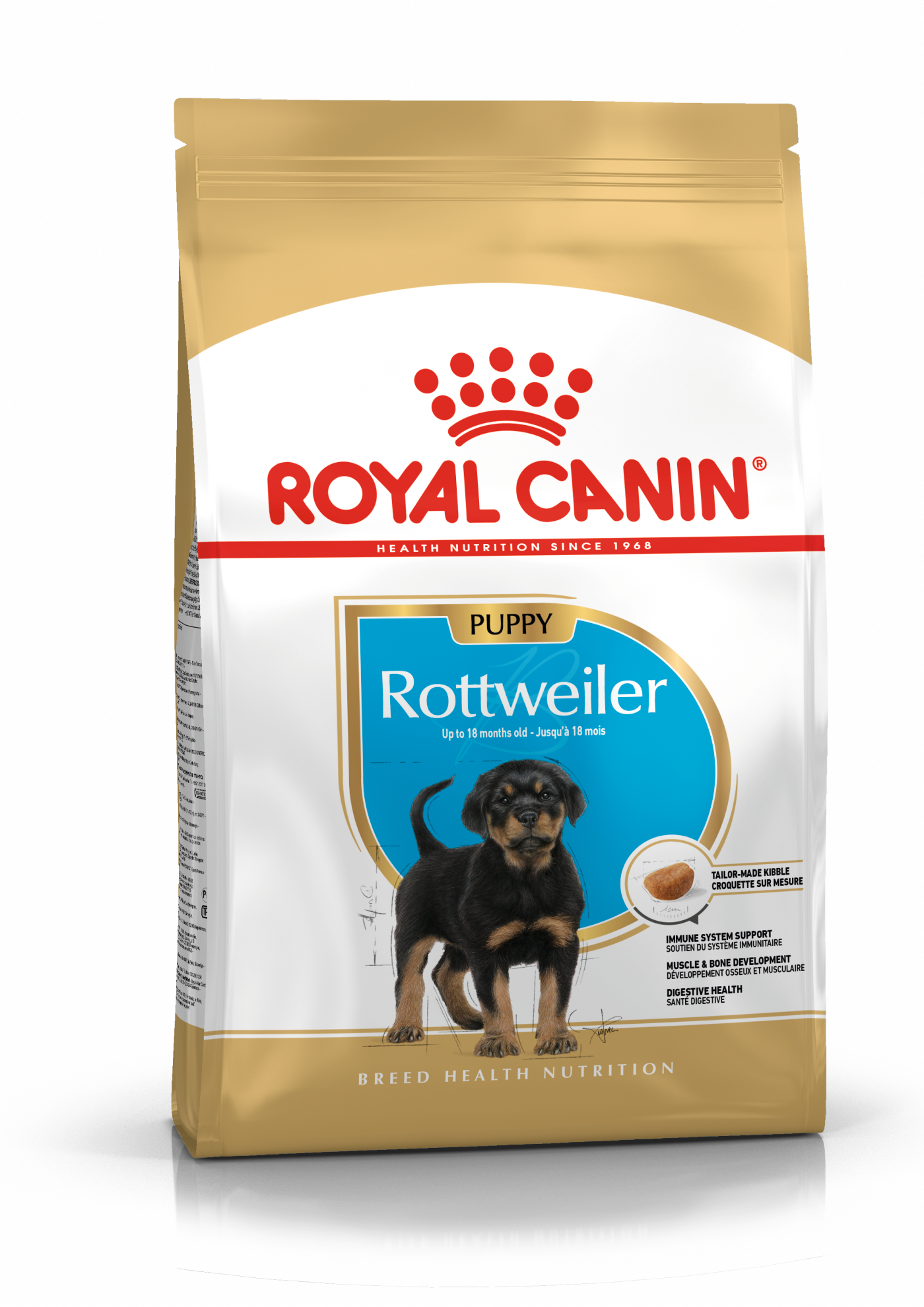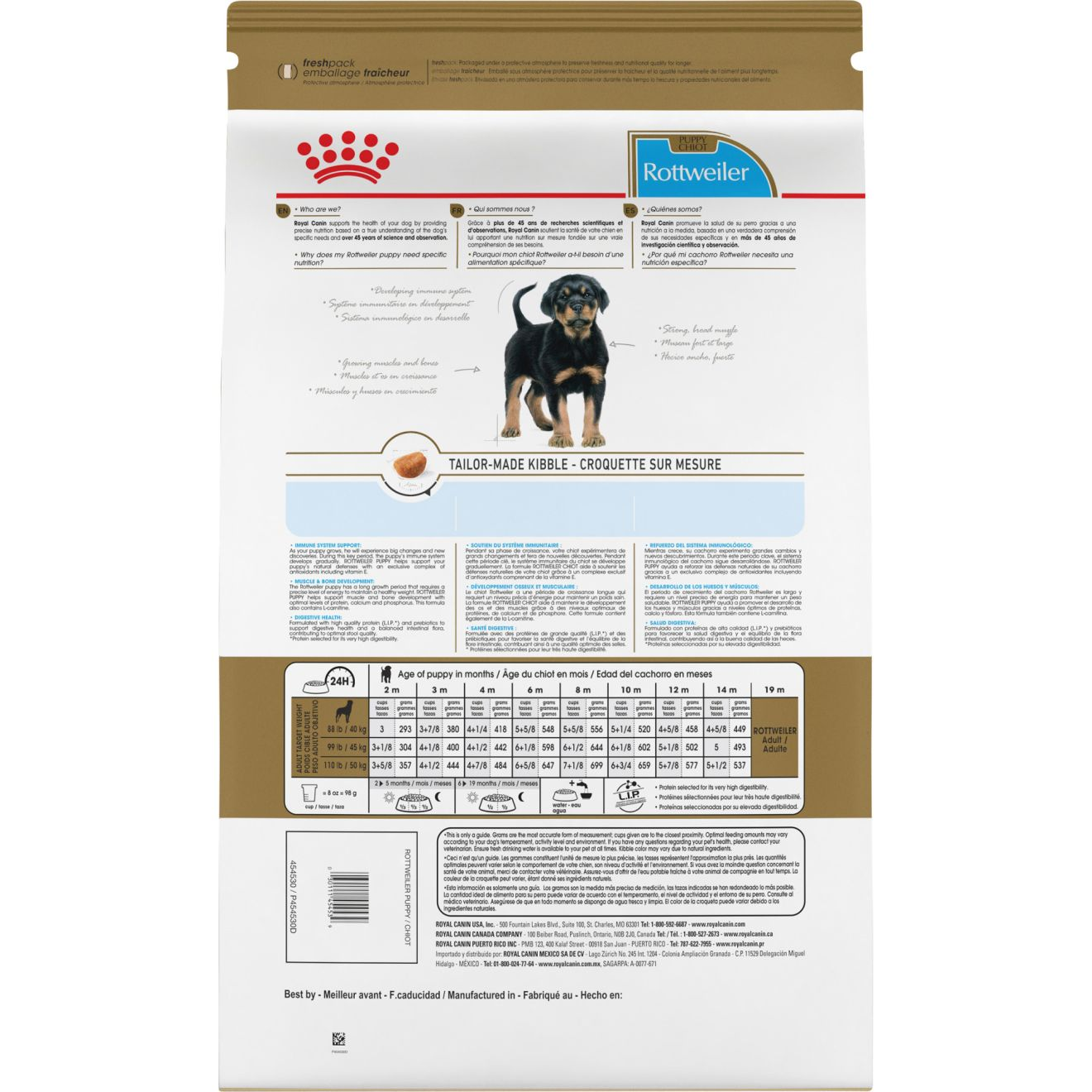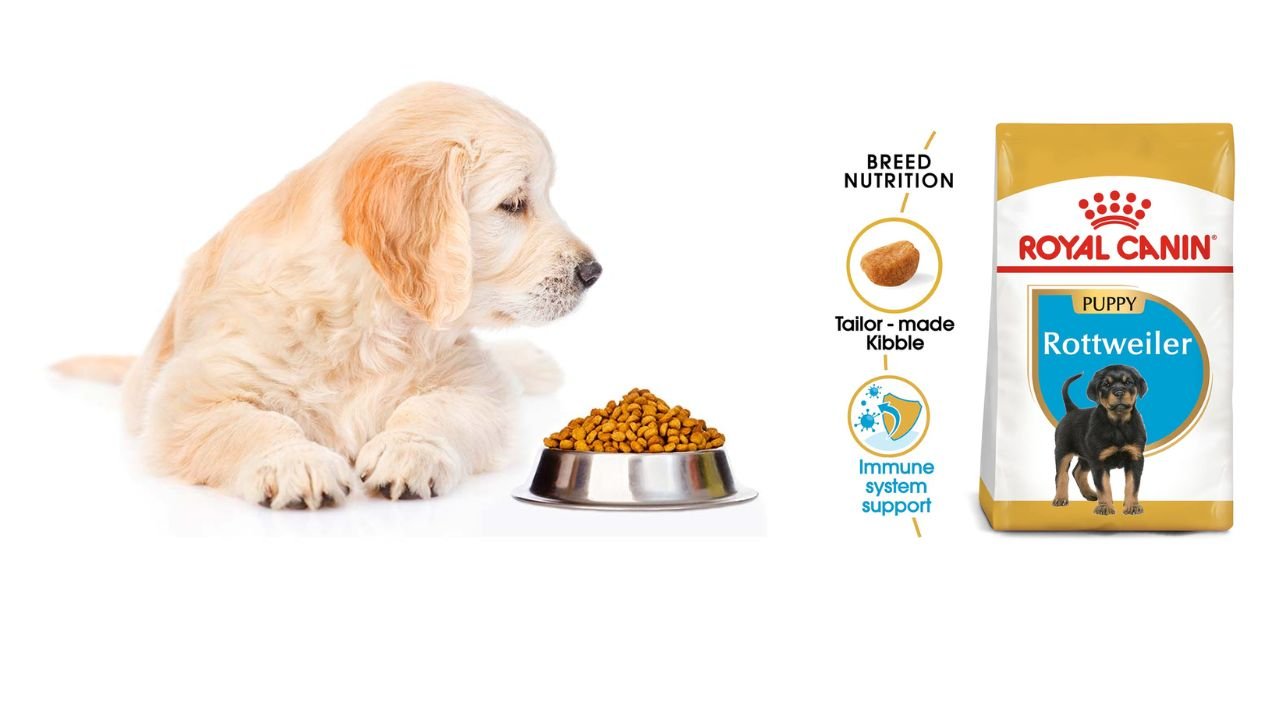Dog Food for Rottweiler Puppies. For Rottweiler puppies, it is important to feed them a high-quality dog food that is specifically formulated for large breed puppies. These foods contain the necessary nutrients and balanced levels of protein and fat to support their growth and development.
Rottweiler puppies require a specialized diet to support their growth and development. It is essential to feed them a high-quality dog food that is designed for large breed puppies. These foods contain the appropriate balance of protein, fat, and other essential nutrients that will help your Rottweiler puppy grow into a healthy adult dog.
Additionally, it is important to avoid overfeeding your puppy, as excess weight can cause health problems later in life. By providing your Rottweiler puppy with a proper diet and exercise regimen, you can help ensure a happy and healthy life for your furry friend.
The Importance Of Proper Nutrition For Rottweiler Puppies
The Importance of Proper Nutrition for Rottweiler Puppies
Rottweiler puppies are adorable bundles of energy and love, but they require special attention when it comes to their diet. Proper nutrition is crucial for their growth, development, and overall health. As a responsible pet owner, it’s important to understand the specific nutritional needs of Rottweiler puppies to ensure they grow into strong and healthy adults.
Growth And Development
Rottweiler puppies grow rapidly during their first year, so providing the right balance of nutrients is essential for their bone and muscle development. A diet rich in high-quality protein, healthy fats, and essential vitamins and minerals supports their growth and helps them reach their full potential.
Health Risks And Prevention
Rottweiler puppies are prone to certain health risks, such as joint issues and obesity. By feeding them a well-balanced diet and controlling their portions, pet owners can help prevent these risks and promote a healthy weight for their puppies.
Characteristics Of Rottweiler Puppies
Rottweiler puppies are known for their distinct characteristics that set them apart from other breeds. Understanding their physical attributes and dietary requirements is crucial in providing them with the best care and nutrition. Let’s delve into the specific traits and needs of Rottweiler puppies.
Physical Attributes
Rottweiler puppies are robust and muscular, with a distinctive black coat marked with rich tan markings. Their strong build and powerful appearance make them an imposing yet affectionate breed. As they grow, their weight and height can reach impressive proportions, requiring a balanced diet to support their development.
Dietary Requirements
Rottweiler puppies have specific nutritional needs to promote their growth and overall well-being. A high-quality diet rich in protein, healthy fats, and essential nutrients is essential for their muscle development and energy levels. A balanced diet that includes lean meats, whole grains, and vegetables is vital to support their active lifestyle and maintain a healthy weight.
Essential Nutrients For A Growing Rottweiler
For a growing Rottweiler, it’s essential to provide a balanced diet with key nutrients. Look for dog food formulated for large breed puppies, ensuring it contains adequate protein, calcium, and phosphorus for healthy bone and muscle development. Additionally, omega-3 fatty acids and DHA support brain and vision development.
Protein Content
When it comes to the nutrition of growing Rottweiler puppies, protein is essential for their healthy development. Protein is the building block of muscle and plays a crucial role in supporting their growth and repair processes. Ideally, their dog food should contain a high-quality source of animal-based protein, such as chicken, beef, or fish. These proteins provide the necessary amino acids that aid in muscle development and overall well-being. A protein content of around 25% to 30% in their diet is recommended to meet their specific needs.
Vitamins And Minerals
In addition to protein, Rottweiler puppies also require a balanced blend of vitamins and minerals to support their growth and development. These essential nutrients contribute to their overall health, immune system function, and bone strength. A diet rich in vitamins A, D, and E helps promote healthy vision, bone formation, and a strong immune system. Essential minerals like calcium, phosphorus, and zinc are vital for proper bone and teeth development. Including a variety of fruits and vegetables in their diet can help provide these essential vitamins and minerals naturally.
Fats And Carbohydrates
Fats and carbohydrates are another important component of a Rottweiler puppy’s diet. While too much fat can lead to weight gain, a moderate amount is necessary for providing energy and supporting brain development. Look for dog foods that contain healthy sources of fats, such as fish oil or flaxseed, which are rich in omega-3 fatty acids. These fatty acids contribute to healthy skin and coat. Carbohydrates, on the other hand, are the main source of energy for your growing puppy. Opt for whole grains like brown rice or oats, which provide a slow release of energy throughout the day.
To summarize, when choosing the right dog food for your growing Rottweiler puppy, it is important to consider the essential nutrients they need for their development. This includes a sufficient protein content, a balanced blend of vitamins and minerals, and a moderate amount of healthy fats and carbohydrates. By providing them with a well-rounded diet, you can ensure their overall health and support their growth into strong and thriving adults.

Credit: www.petfoodcyprus.com
Evaluating Commercial Dog Food
Evaluating commercial dog food is crucial for the health and well-being of Rottweiler puppies. Understanding the label reading skills, ingredients to look for, and additives to avoid can help you make informed decisions about the best food for your furry friend.
Label Reading Skills
- Check for a statement of nutritional adequacy from AAFCO.
- Look for a named protein source as the first ingredient.
- Ensure the food is appropriate for puppies.
Ingredients To Look For
- High-quality animal proteins like chicken, beef, or fish.
- Healthy fats such as omega-3 and omega-6 fatty acids.
- Fruits and vegetables for essential vitamins and minerals.
Additives To Avoid
- Avoid artificial colors, flavors, and preservatives.
- Avoid excessive fillers like corn, wheat, and soy.
- Steer clear of by-products and unnamed meat sources.
Top Picks For Rottweiler Puppy Food
Choosing the right food for your Rottweiler puppy is crucial to their growth and development. To ensure they receive the right balance of nutrients, it’s important to select high-quality dog food specifically formulated for their needs. Here are our top picks for Rottweiler puppy food, categorized into dry food favorites, wet food wonders, and grain-free options:
Dry Food Favorites
Dry dog food is a popular choice for many Rottweiler owners due to its convenience and long shelf life. Here are some dry food options that are highly recommended for Rottweiler puppies:
- Brand A: This premium dry food is specially formulated for large breed puppies like Rottweilers. It contains a balanced blend of proteins, fats, and carbohydrates to support their healthy growth.
- Brand B: Made with real chicken as the main ingredient, this dry food is packed with essential vitamins and minerals. It also includes added glucosamine and chondroitin for joint health, which is important for large breed puppies.
- Brand C: This grain-inclusive dry food is rich in omega-3 fatty acids, promoting a healthy coat and skin. It also includes probiotics for better digestion and optimal nutrient absorption.
Wet Food Wonders
Wet dog food is a great option for Rottweiler puppies who may prefer a softer texture or have difficulty chewing dry kibble. Here are some wet food options that are highly recommended:
- Brand D: This wet food is made with real beef and vegetables, providing a high protein and nutrient-rich meal for your Rottweiler puppy. It is also free from artificial additives and fillers.
- Brand E: Formulated with a blend of chicken, brown rice, and fruits, this wet food offers a balanced diet for your Rottweiler puppy. It is also enriched with DHA for brain development.
- Brand F: This wet food is specially designed for large breed puppies and contains a mix of chicken, sweet potatoes, and peas. It is grain-free and packed with antioxidants to support their immune system.
Grain-free Options
For Rottweiler puppies with sensitivities or allergies to grains, grain-free dog food can be a suitable choice. Here are some grain-free options to consider:
- Brand G: This grain-free formula is made with real salmon as the primary ingredient, providing high-quality protein and omega-3 fatty acids for joint and coat health. It also includes a variety of fruits and vegetables for added nutrition.
- Brand H: Formulated with a blend of turkey, peas, and sweet potatoes, this grain-free food is gentle on the stomach and promotes optimal digestion. It is also fortified with vitamins and minerals for overall health.
- Brand I: This grain-free option features a combination of duck, lentils, and peas, providing a well-balanced and easily digestible meal for your Rottweiler puppy. It is also free from artificial preservatives and flavors.
Remember, it’s essential to consult with your veterinarian before making any changes to your Rottweiler puppy’s diet. They can provide personalized recommendations based on your puppy’s specific needs and ensure they are receiving the best possible nutrition.

Credit: www.youtube.com
Feeding Schedule And Portions
To ensure the healthy growth of Rottweiler puppies, it’s important to establish a feeding schedule and portion control. Feed them high-quality dog food specifically formulated for large breed puppies. Divide their daily food into 3-4 meals to prevent overeating and digestive issues.
Rottweiler puppies are a large breed and require a specific feeding schedule and portion sizes to ensure they grow up healthy and strong. Here are some guidelines for meal planning, portion sizes, and frequency of feeding.
Meal Planning
When planning your Rottweiler puppy’s meals, it’s important to choose high-quality dog food that is specifically formulated for large breeds. Look for a food that is high in protein and contains essential nutrients like calcium and phosphorus.
Portion Sizes
Portion sizes for Rottweiler puppies vary based on their age and weight. As a general rule, puppies should be fed three to four small meals a day until they are six months old. After six months, you can reduce the number of meals to two a day.
The following table provides a general guideline for portion sizes based on your puppy’s weight:
| Weight | Daily Portion Size |
|---|---|
| 10-20 lbs | 1-1.5 cups |
| 20-40 lbs | 1.5-2.5 cups |
| 40-60 lbs | 2.5-3.5 cups |
| 60-80 lbs | 3.5-4.5 cups |
Frequency Of Feeding
Rottweiler puppies should be fed three to four small meals a day until they are six months old. After six months, you can reduce the number of meals to two a day. It’s important not to overfeed your puppy, as this can lead to obesity and other health problems later in life.
In conclusion, feeding your Rottweiler puppy a high-quality dog food that is specifically formulated for large breeds, following a specific feeding schedule and portion sizes, can help ensure they grow up healthy and strong. By providing them with the proper nutrition, you can give them the best chance at a long and happy life.
Home-cooked Vs. Store-bought
Rottweiler puppies require a well-balanced diet to support their growth and development. When it comes to choosing the right food for your Rottweiler puppy, you may be faced with the decision between home-cooked meals and store-bought options. Both choices have their own set of pros and cons, as well as considerations for nutritional balance and recipe ideas.
Pros And Cons
Home-cooked meals give you control over the ingredients, allowing you to ensure the quality and freshness of the food. On the other hand, store-bought options offer convenience and often come with added nutrients specifically formulated for puppies.
Nutritional Balance
When preparing home-cooked meals, it’s crucial to ensure that your Rottweiler puppy’s diet is nutritionally balanced. This means incorporating a mix of protein, carbohydrates, healthy fats, vitamins, and minerals to support their overall health and development.
Recipe Ideas
For homemade meals, consider recipes that include lean proteins such as chicken or turkey, healthy grains like brown rice or quinoa, and a variety of vegetables such as carrots, spinach, and sweet potatoes. Always consult with a veterinarian or canine nutritionist to ensure your recipes meet your puppy’s specific nutritional needs.
Transitioning To Adult Food
Rottweiler puppies require a balanced diet to support their growth and development. As your Rottweiler puppy grows, you will need to transition them from puppy food to adult food. This transition is crucial to ensure that your Rottweiler continues to receive the necessary nutrients for optimal health and well-being.
When To Switch
When a Rottweiler puppy should transition to adult food depends on their individual growth and development. Typically, the transition should begin around the age of 12 to 18 months. It’s important to monitor your puppy’s growth and consult with a veterinarian to determine the appropriate timing for the switch.
How To Transition
Transitioning your Rottweiler puppy to adult food should be done gradually over a period of about 7 to 10 days. Start by mixing small amounts of adult food into their puppy food, gradually increasing the proportion of adult food while decreasing the puppy food. This gradual transition helps prevent digestive upset and allows your puppy to adjust to the new food.
Adult Diet Considerations
As your Rottweiler transitions to adult food, it’s important to consider their specific dietary needs. Look for high-quality adult dog food formulated for large breeds. Consider options that contain adequate protein to support muscle development and essential nutrients such as omega-3 fatty acids for coat and skin health.
Common Health Issues And Diet
Discover the key health issues facing Rottweiler puppies and the ideal diet to support their well-being. Explore the best dog food options tailored to meet the unique nutritional needs of growing Rottweilers.
Rottweiler puppies are adorable, but they come with their fair share of health concerns. It’s essential to feed them a well-balanced diet to ensure they grow up healthy and strong. In this article, we’ll cover some of the common health issues that Rottweiler puppies face and how their diet can help prevent or manage them.
Obesity Prevention
Rottweilers are a large breed, and they tend to put on weight quickly. Obesity can lead to a range of health problems, including joint pain, heart disease, and diabetes. To prevent obesity, you should ensure that your Rottweiler puppy is getting enough exercise and is eating a healthy diet.
A balanced diet for your Rottweiler puppy should consist of high-quality protein, healthy fats, and complex carbohydrates. Avoid feeding them table scraps or too many treats, as this can contribute to weight gain. Instead, opt for healthy snacks like fruits and vegetables.
Joint Health
Rottweilers are prone to joint problems, such as hip dysplasia and arthritis. A diet rich in glucosamine and chondroitin can help support joint health and reduce the risk of joint problems. These nutrients can be found in foods like fish, chicken, and beef.
It’s also essential to avoid overfeeding your Rottweiler puppy, as excess weight can put added stress on their joints. Regular exercise is also crucial for maintaining joint health.
Allergy Management
Rottweilers can suffer from food allergies, which can cause skin irritation, itching, and digestive problems. To manage allergies, you should avoid feeding your puppy foods that contain common allergens like wheat, soy, and corn.
Instead, opt for a diet that is free of these allergens and includes high-quality protein sources like lamb, fish, or chicken. If your puppy does develop an allergy, consult with your veterinarian to determine the best course of action.
In conclusion, by feeding your Rottweiler puppy a healthy, well-balanced diet, you can help prevent or manage many common health issues. Remember to provide them with regular exercise, limit their treats, and consult with your veterinarian if you have any concerns about their health.
Supplements For Optimal Health
When it comes to raising a healthy and happy Rottweiler puppy, nutrition plays a crucial role. Along with a balanced diet, supplements can provide additional support for their overall well-being. In this article, we will explore three key supplements that can help ensure optimal health for your Rottweiler puppy: Joint Supplements, Omega Fatty Acids, and Probiotics and Digestive Aids.
Joint Supplements
Rottweiler puppies are prone to certain joint issues due to their rapid growth and large size. To support their joint health, it is important to consider incorporating joint supplements into their diet. These supplements typically contain ingredients such as glucosamine, chondroitin, and MSM that promote joint lubrication, reduce inflammation, and support cartilage health.
Including joint supplements in your Rottweiler puppy’s diet can help prevent or alleviate conditions like hip dysplasia and arthritis, which are common in the breed. It is recommended to consult with your veterinarian to determine the appropriate dosage and type of joint supplement for your puppy.
Omega Fatty Acids
Omega fatty acids, specifically omega-3 and omega-6, play a vital role in the overall health of Rottweiler puppies. These essential fatty acids are known for their anti-inflammatory properties and their ability to support a healthy coat and skin.
By including omega fatty acids in your puppy’s diet, you can help reduce the risk of skin allergies, promote a shiny and lustrous coat, and support brain development. Fish oil supplements are a popular source of omega-3 fatty acids, while sources of omega-6 include vegetable oils like flaxseed oil or evening primrose oil.
Probiotics And Digestive Aids
Probiotics and digestive aids are beneficial supplements for Rottweiler puppies as they promote a healthy gut and aid in digestion. These supplements contain beneficial bacteria that can help maintain the balance of the gut flora, improve nutrient absorption, and support a strong immune system.
Rottweilers can be prone to digestive issues, such as sensitive stomachs or food allergies. Including probiotics and digestive aids in their diet can help alleviate these issues and promote regular bowel movements. Yogurt, kefir, or specific probiotic supplements designed for dogs can be effective options to consider.
Remember, before introducing any supplements into your Rottweiler puppy’s diet, it is important to consult with your veterinarian. They can provide guidance on the appropriate dosage and help determine which supplements will be most beneficial for your puppy’s specific needs.
Expert Insights
Veterinarian Recommendations
Rottweiler puppies require a diet rich in protein and balanced nutrients. Veterinarians suggest feeding high-quality puppy food to support their growth and development.
Breeders’ Feeding Tips
Breeders emphasize the importance of feeding Rottweiler puppies multiple small meals throughout the day to maintain energy levels and prevent bloating.
Nutritionist’s Advice
Nutritionists stress the significance of including essential vitamins and minerals in the diet of Rottweiler puppies to promote overall health and well-being.
Customer Reviews And Testimonials
When it comes to choosing the best dog food for your Rottweiler puppy, hearing from other pet parents can provide valuable insights and reassurance. Customer reviews and testimonials offer real-life experiences and opinions that can help you make an informed decision for your furry friend. Here are some highlights from parent experiences, puppy reactions, and long-term benefits of using high-quality dog food for Rottweiler puppies.
Parent Experiences
Many pet parents have shared positive experiences with feeding their Rottweiler puppies high-quality dog food. They have noticed a significant improvement in their puppy’s overall health and well-being. With a balanced diet and essential nutrients, Rottweiler puppies have shown increased energy levels, shiny coats, and healthy digestion. The testimonials highlight the satisfaction and peace of mind that comes from knowing their puppy is getting the best nutrition possible.
Puppy Reactions
One of the most important aspects of choosing the right dog food for Rottweiler puppies is their reaction to it. Customer reviews often mention how their puppies eagerly devour their meals, indicating a great taste and palatability. This is crucial, as a picky eater can be a challenge for pet parents. The positive puppy reactions reported in the testimonials give pet parents confidence that their Rottweiler puppies will enjoy and benefit from the chosen dog food.
Long-term Benefits
Choosing a high-quality dog food for Rottweiler puppies can have long-term benefits for their overall health and development. The testimonials reveal that puppies who are fed nutritious dog food from an early age have better muscle development, stronger bones, and improved immune systems. This sets a solid foundation for their future growth and reduces the risk of common health issues. The long-term benefits mentioned by satisfied pet parents emphasize the importance of providing optimal nutrition during the crucial puppy stage.
By considering the experiences shared in customer reviews and testimonials, you can gain valuable insights into the benefits of choosing the right dog food for your Rottweiler puppy. These real-life stories from pet parents who have already taken this important step can guide you towards making the best decision for your furry friend’s health and happiness.

Credit: www.royalcanin.com
Frequently Asked Questions
Dog Food for Rottweiler Puppies?
Dog Food for Rottweiler Puppies. For Rottweiler puppies, it is important to feed them a high-quality dog food that is specifically formulated for large breed puppies. These foods contain the necessary nutrients and balanced levels of protein and fat to support their growth and development.
What Is The Best Food To Feed A Rottweiler Puppy?
The best food for a Rottweiler puppy is high-quality, specially formulated puppy food rich in protein and nutrients. Avoid table scraps and foods toxic to dogs.
How Much Should A 12 Week Old Rottweiler Eat?
A 12 week old Rottweiler should eat about 1 to 1. 5 cups of high quality dry puppy food divided into 3 meals per day. The food should have a protein content of 25% to 30%, and fat content of 12% to 15%.
Avoid overfeeding to prevent obesity and health issues.
What To Buy My Rottweiler Puppy?
To ensure your Rottweiler puppy’s well-being, here are some essential items to buy: a high-quality dog food, a comfortable bed, toys for mental stimulation and physical exercise, a collar with identification tags, and grooming supplies like a brush and nail clippers.
Can I Feed My Rottweiler Puppy Raw Eggs?
Yes, you can feed your Rottweiler puppy raw eggs as an occasional treat for added protein and nutrients.
Conclusion
To wrap up, choosing the right dog food for Rottweiler puppies is crucial. Providing a balanced diet ensures their growth and health. Remember, consult with a vet, consider their unique needs, and opt for high-quality, age-appropriate nutrition. Your Rottweiler puppy’s well-being starts with proper nutrition.

Hello I am Farhana I have been doing research on dogs since last 10 years. I have been doing research on dog special parts or dog food since last 10 years. I have gained knowledge about my dog in these ten years so. I want to blog about it daily.

